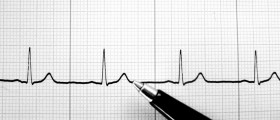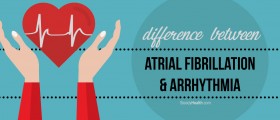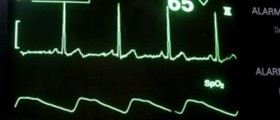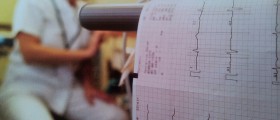
Heart arrhythmia and the main characteristics
Heart arrhythmia is a medical term for the conditions that are characterized by too fast, too slow or irregular heartbeats. The culprit is usually improper functioning of electrical impulses and conditions such as heart diseases, diabetes, hypertension, and hyperthyroidism which leads to arrhythmia. It can also be caused by bad habits such as smoking, excessive intake of alcohol or caffeine and drug abuse.
Types of arrhythmia
The speed of the heart rate determines whether arrhythmia will be classified as tachycardia or bradycardia. Tachycardia is actually a term used for fast heartbeat, while slow heartbeat is medically termed as bradycardia. As for tachycardias, they can originate in the atria or originate in ventricles.
Atrial fibrillation, atrial flutter, supraventricular tachycardia and Wolff-Parkinson-White syndrome are the types that originate in atria, while ventricular tachycardia, ventricular fibrillation and long QT syndrome are arrhythmias that originate in the ventricles. Atrial fibrillation is particularly common in people who are older than 60, and the main reason for that is wearing and tearing of the heart, particularly in cases of those who suffer from some heart problem. In cases of atrial fibrillation, there are 350 to 600 beats in a minute and over time, this condition can provoke more than serious consequences. Atrial flutter does not differ too much from atrial fibrillation, except that the heartbeats are a bit more organized and coordinated, and it occurs as a consequence of a loop of electricity in the heart’s upper chambers. Supraventricular tachycardia is characterized by sudden beginning and ending of rapid heartbeats, which may even last for hours sometimes. Very frequently, this condition is caused by some heart condition, but although it is very uncomfortable, it is rarely life threatening. Wolff-Parkinson-White syndrome is a type of supraventricular tachycardia, which is provoked by abnormal electrical connection in the heart, and it is a very common type of tachycardia in children. Ventricular tachycardia is typical of those who already had a heart attack or some other heart problem that has left a scar or damage within the ventricle muscle. This condition is not life threatening, and it usually does not last longer than a minute. Ventricular fibrillation is characterized by useless quivering of ventricles, due to the rapid and chaotic electrical impulses. They thus cannot pump the blood, which results in cutting off blood supply to vital organs and since the brain is also affected, people usually lose their consciousness. Long QT syndrome might also result in fainting, but it might be life threatening as well since the heart might beat so irregularly that it will cause unexpected death.
















Your thoughts on this
Loading...